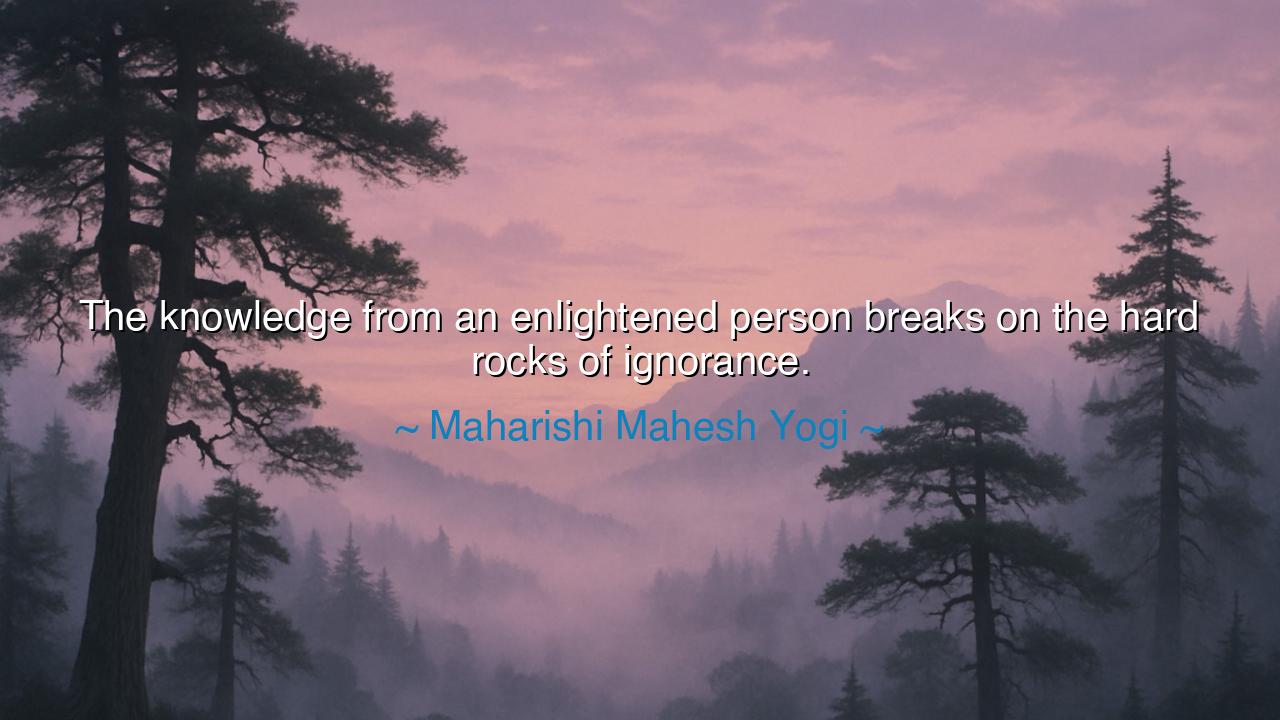
The knowledge from an enlightened person breaks on the hard rocks






Hear the words of Maharishi Mahesh Yogi, the sage who brought meditation to the modern world, who declared: “The knowledge from an enlightened person breaks on the hard rocks of ignorance.” In this saying, he reveals a bitter truth of the human condition: that the pure light of knowledge, when it shines upon minds clouded by pride, prejudice, or blindness, does not always penetrate. Instead, it crashes like waves upon a cliff, scattering into fragments, unable to soften the stone of ignorance.
The enlightened person does not lack clarity, nor is their message weak. The weakness lies in those who hear but do not listen, who see but refuse to perceive. Like pearls cast before those who cannot recognize their worth, the wisdom of sages is often rejected, distorted, or dismissed. History is filled with such tragedies, where those who bore truth and compassion were met with resistance, for ignorance is not mere absence of knowledge but a stubborn shield against it.
Consider the story of Socrates, the great philosopher of Athens. His teachings urged men to question, to examine themselves, to pursue virtue above wealth or status. Yet his words fell upon many deaf ears, and the leaders of Athens, threatened by his challenge, condemned him to death. Here we see the very image of the Maharishi’s teaching: knowledge breaking upon the rocks of ignorance. The truth of Socrates did not fail in itself, but it could not pierce the stone walls of arrogance and fear that surrounded his accusers.
This pattern repeats across the ages. The prophets of Israel, the Buddha, Christ, and countless saints and teachers spoke truths that could liberate hearts. Yet many who heard them resisted, preferring the comfort of their own illusions. Even in science, we see this law. When Galileo declared that the Earth moved around the Sun, his knowledge clashed against the hardened ignorance of his age, and he was silenced. It was not the truth that was weak—it was the minds of men that were too rigid to receive it.
Maharishi’s words also serve as a call for humility. For the rocks of ignorance are not only found in others—they can harden within ourselves. How often do we resist advice, turn away from correction, or reject truths because they do not flatter us? Each time we cling to our illusions, we become like stone before the river of wisdom. The wise do not only see the ignorance of the world but seek to soften their own hearts, to remain open to the flow of higher understanding.
The lesson is clear: if we would benefit from the knowledge of the enlightened, we must prepare the soil of our minds. We must loosen the stones of pride, break apart the crust of prejudice, and allow the waters of wisdom to seep within. Only then can the words of sages bear fruit. To resist is to remain barren; to receive is to grow. Thus, the responsibility lies not only upon the teacher to speak but upon the listener to open.
So I say unto you: cultivate humility, seek silence, and soften your heart like fertile earth. When wisdom comes—whether through a book, a teacher, a friend, or even a moment of inner clarity—do not let it shatter upon the rocks of your own stubbornness. Receive it, cherish it, let it transform you. For as Maharishi Mahesh Yogi declared, the knowledge from an enlightened person breaks upon the rocks of ignorance. Let not your soul be stone, but living soil, that wisdom may take root and grow into the tree of life.
Thus his words endure as both warning and hope: wisdom will always flow, but only the open heart can drink of it. The choice is ours—stone or soil, resistance or growth. And in that choice lies the destiny of every soul.






AAdministratorAdministrator
Welcome, honored guests. Please leave a comment, we will respond soon